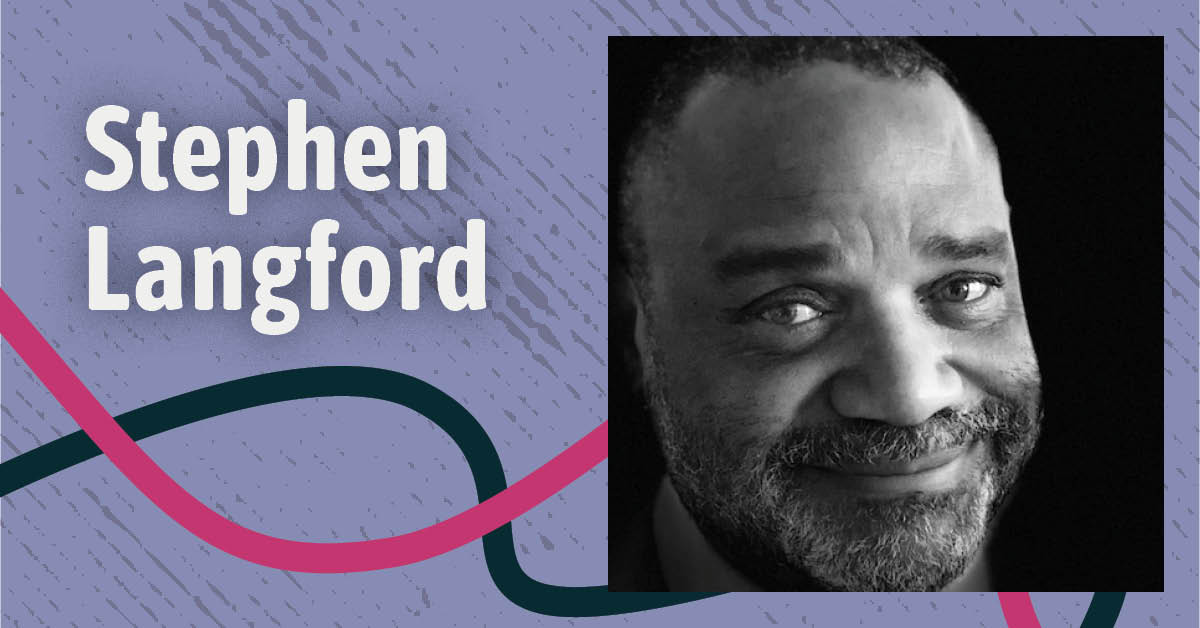Two astronauts go into space with a mysterious new technology. One is jealous of the other. Their secret mission is to make first contact with aliens. But before they can, the jealous astronaut, desiring recognition, succumbs to murderous violence.
This isn’t the life story of Stephen Langford—a screenwriter, producer, director, and alum of the Master of Fine Arts program at Antioch Santa Barbara—but instead is a partial summary of “The Right Snuff,” an episode of Creepshow, the 2019 TV series that he co-wrote along with Paul Dini and Greg Nicotero. For Langford, screenwriting holds a particular magic as it brings his imagination to life. “It’s hard to explain,” he says. “It never gets old. The actors show up, and people that were in my head for years are now sitting there.”
Langford has had a long career as a TV writer, including stints as a staff writer for Silver Spoons, an 80’s sitcom, and writing for Family Matters, Malcolm and Eddie, and a wide array of other shows and films.
Mid-career, he branched out by attending Antioch University Santa Barbara’s MFA in Writing & Contemporary Media, where he was able to explore the form of novel-writing and connect back to science fiction. Comedy comes naturally to Langford, but he has a deep love for science fiction and fantasy, engendered by early experiences with The Twilight Zone and Star Trek. His present work and upcoming projects (Creepshow among them) are a fulfillment of his earliest inspirations, materialized from a life of prolific, multi-genre writing.
Really Good at One Thing
Langford was born in Western Massachusetts, but it was only after his family moved to Shaker Heights, Ohio, that he made his first film—a “Marx-Brothers-type” movie on a Super 8 camera, created in collaboration with friends. Cinema was a form that he immediately took to. As Langford says, “When I was fourteen, I was writing screenplays. My parents didn’t understand why a fourteen-year-old would be writing one-hundred page screenplays. I guess I wasn’t normal.”
At that time, Star Trek had just been put into syndication, and reruns were readily available. Langford became obsessed. He read The Making of Star Trek by Gene Rodenberry. “There was a point where I read this outline for the pilot, and I remember it said how much Gene Rodenberry got paid,” says Langford. “It seemed like a lot of money to me at the time. I looked at it, and I thought: I can do that. I can write that. That won’t be a problem.”
In middle school Langford struggled with typical academic settings. “I just wasn’t good at school,” he explains. Nonetheless, he had short stories published in the school paper, and his English teacher encouraged him. Says Langford, “I was lucky to have that person who said, ‘You can do this’… I resolved at that age to be really good at one thing.” That thing, he decided, would be writing.
The “Kid From Nowhere”
In his latter teens, Langford moved with his family to Sudbury, Massachusetts, twenty miles west of Boston. When the local high school required him to do an internship, his first choice, since his father was a pilot, was Logan Airport. He did the internship but found that it “wasn’t that interesting.” He then decided to intern at The Massachusetts Film Office. Before he knew it, as a high schooler, he was on the set of Coma with Michael Douglas. This was his first entry point into the entertainment industry. As he says, “I was a kid from nowhere. My family had no roots in the business at all.”
Langford says that he was quickly noticed for his work ethic. “The location manager spotted me and said ‘Hey, do you want to work on movies?’” Langford was immediately enthusiastic and said that yes, he did.
So throughout High School he periodically worked on film sets. At eighteen, he was a PA on the set of Oliver’s Story. This parallel work continued as he went to college. He studied film at Emerson College, where he developed a close friendship with his roommate Paul Dini—who also went on to have a long career as a screenwriter and also a comic creator, perhaps best known for co-creating the DC character Harley Quinn.
Through his work on sets, Langford was exposed to iconic celebrities of the era, such as Paul Newman and Gene Wilder. “I saw all these people as a casual observer,” he says. “I saw cinematic history.” But as impressed as he was, he also learned it was ordinary. It was part of the work.
A Necessary Initiation Into the Industry
After graduating college with a Bachelor of Science in Film, Langford interviewed to be an assistant on the show Silver Spoons. The job was at Universal Pictures in Los Angeles. He flew out for the interview, and as he says, “It was a one-way-ticket story.” He got the job but didn’t enjoy the work. So he continued to write.
This period of suffering turned out to be a necessary initiation. Say Langford, “It wasn’t a happy time, but the players in my career, my life, they were all centered around that moment… My future was all within a matter of a couple hundred yards. The whole narrative of my life was sitting right there.”
In 1986 Langford began selling television scripts. He left the assistant job, and returned to Silver Spoons as a staff writer. This was almost unheard-of mobility within the hierarchy of the set. Says Langford, “To leave as an assistant and come back as a writer was amazing.” The story editor who hired him became his career mentor. Later, on that same set, he met his future wife.
Television, Film and Antioch
Although Langford’s very first sold script was for Ewoks—a little-loved Star Wars spinoff for which he wrote a spec script at the behest his college friend Paul Dini—his early career was dominated by sitcom writing. Comedy came naturally to Langford. As he says, “I had never written comedy, I was just writing genre stuff. And I sat down and for some reason I was able to write comedy… There must be comedy DNA in my family somewhere that I don’t know about.”
This proficiency guided the early course of Langford’s work. His eight years writing for Family Matters, a 90’s sitcom about a middle-class African-American family living in Chicago, is iconic. His other television credits are numerous, including scripts for Malcom and Eddie, Just Deal, Romeo!, Miracle’s Boys, and Tiny Toon Adventures, among many others. In the 2000’s Langford began to write for film as well. Most of these were comedies, including Lovewrecked, Dude, Where’s My Dog?! , and She’s With Me. Langford also worked as a director and producer, and ran a film company called Dream Factory Entertainment.
But eventually he felt stuck—or, as he puts it, “cocooned.” In the midst of a robust career, he wasn’t sure where to push his talents next. That was when his wife suggested that he go to graduate school and earn a degree that would allow him to teach. This led him to Antioch Santa Barbara’s MFA program—but the program’s effect on his writing was more profound than just a simple credentialing.
Mid-Career Growth Through Antioch
At Antioch, Langford studied under the mentorship of the novelist and playright Colette Freedman. In workshops, he learned that he could make his writing more intentional and exact. As he says, “I found a certain precision in writing that I didn’t quite have. It’s still ongoing and increasing.” He also studied different forms of writing, and through comparison gained a heightened consciousness of technique.
A notable object of study was the writing of Ernest Hemingway. As Langford explains, “One of the things that Hemingway did was, the way he would write, it was like you were the camera. He would take you where you needed to look in your mind. That was unique in those days. That in my head is a movie. Conversely, you couldn’t write in a script that way.” A screenplay is written with the director in mind, needing for example to describe camera movements. Fiction doesn’t need that, so it can describe other things more. It can linger in moments that a screenplay would cut past.
These comparative ideas energized Langford, and he put them into practice for his final MFA project. When Freedman asked Langford what he wanted to do, he immediately thought of the science fiction novels of his youth. As he says, “I went back to being a fifteen-year-old…I imagined this three-hundred-page science fiction novel, soft paperback. I wanted to feel that with my name on it.” He figured he would write “maybe seventy-five” pages, but ended up with a three-hundred and fifty-page draft. For Langford, this marked a return to his original love—creating stories like those told on The Twilight Zone, combining science fiction, futurism, parables of human nature, and relationships between people.
Writing That’s Bigger Than You
Langford still hasn’t published that novel—he’s currently submitting it to publishers—but he could not be more excited about it. In the novel, humanity is exiled from the galactic community as punishment for its brutality and greed. Years later, one trusted human is called to settle an extraterrestrial dispute, and through this mission the human discovers a shocking mystery about the cosmos.
This plot has some similarity with his recent Creepshow episode “The Right Snuff”—the one about two astronauts going into space and then one killing the other. The biggest commonality, aside from space travel, is an abiding interest in questions of power and the flaw of hubris.
Writing is often mythologized as “above reality,” but in Langford’s view, despite the fame and wealth associated with Hollywood, reality is always “breaking in.” As he says “You’re in a writer’s room, and it’s one in the morning, and you’re trying to find the right joke. Or you’re writing a novel alone. It’s work. It’s a different and very interesting kind of work, but in the end it’s a job with anxiety, and you gotta get it right.”
Luckily, for Langford the act of writing often becomes a meditation on his own smallness. As he says, “You have a dream. You put the dream into this machine. And that makes it a permanent dream that’s always out there. It’s pretty sobering. You realize how much bigger it is than you.”
This is not without joy. The inherent magic of screenwriting lies in its ultimate communal existence. Even the writer gets to be surprised. “When you finish the script you know in theory what it’s going to be like,” says Langford. “But then the director comes in. The actors come in. The set designers. And they add layers to your story. Not changing your story. But [adding] visual layers, performance layers…They expand on telling this tale. It’s a pretty extraordinary experience.” This experience keeps Langford coming back, even as he explores new forms of writing.
Langford has accomplished his original MFA goals: he now teaches as a Los Angeles Screenwriting faculty for the New York Film Academy. But he’s also begun sending out his novel to possible publishers, and he continues to write, direct and produce film and television. Some of his newer projects are in the territory of horror and science fiction, which is right where he wants to be: hard at work in the craft of dreams.




